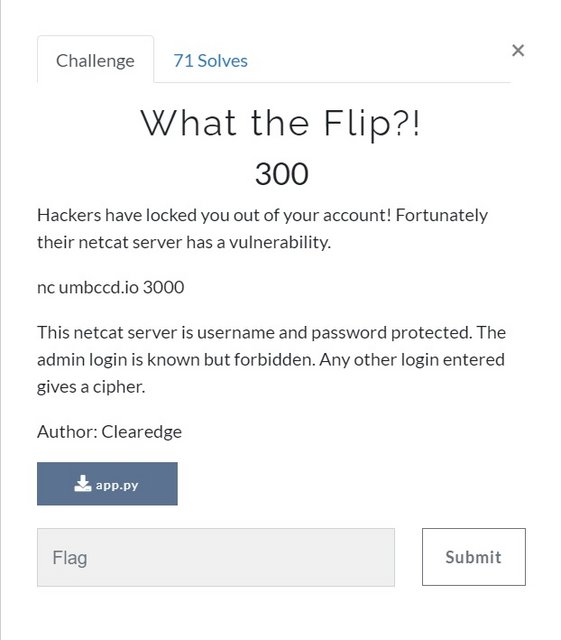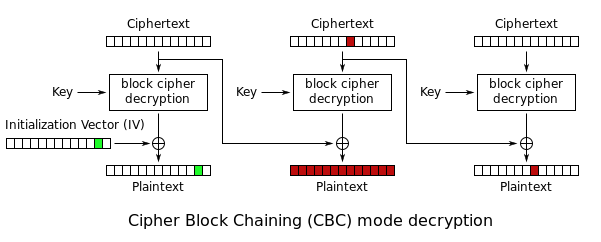Rating:
# What the Flip?!

## FLAG:
`DawgCTF{F1ip4J0y}`
#
## Solution
After a first reading of the [source code](app.py), you immediately notice that a `username` and `password` are required (which are provided for logging to be successful). Furthermore, such data will be encrypted (with a specific format) and will be returned in the form of `ciphertext`.
```python
msg = 'logged_username=' + user +'&password=' + passwd
try:
assert('admin&password=goBigDawgs123' not in msg)
except AssertionError:
send_msg(s, 'You cannot login as an admin from an external IP.\nYour activity has been logged. Goodbye!\n')
raise
send_msg(s, "Leaked ciphertext: " + encrypt_data(msg)+'\n')
send_msg(s,"enter ciphertext: ")
```
But the problem consists in passing the `username` and `password` check that the program does in `decrypt_data`.
```python
def decrypt_data(encryptedParams):
cipher = AES.new(key, AES.MODE_CBC,iv)
paddedParams = cipher.decrypt( unhexlify(encryptedParams))
print(paddedParams)
if b'admin&password=goBigDawgs123' in unpad(paddedParams,16,style='pkcs7'):
return 1
else:
return 0
```
The solution to this problem comes from:
- [operating mode (CBC)](https://en.wikipedia.org/wiki/Block_cipher_mode_of_operation) used to make the encrypt;
- name of the challenge that refers to a known [Bit (or Byte) Flipping Attack](https://crypto.stackexchange.com/questions/66085/bit-flipping-attack-on-cbc-mode).
## Explanation and implementation of the attack
This attack involves modifying a bit (or a group) in order to modify part of the plaintext starting from the ciphertext.

In particular, it exploits the fact that, in the [CBC Mode](https://en.wikipedia.org/wiki/Block_cipher_mode_of_operation#Cipher_block_chaining_(CBC)) decrypt process, each part of the plaintext depends on the ciphertext of the previous block according to the formula:

So the idea you want to follow is to send _username_ or _password_ with a modified character so that they pass the check that is done in _decrypt_data_ and then apply the attack.
By doing so we will know exactly the position of the bit to be modified because CBC works with 16-bit blocks and knowing what the input is and in which format the plaintext is to be encrypted, we will have a complete perception of the composition of the ciphertext.
So we sent `bdmin` as _username_ and `goBigDawgs123` as _password_ with the aim of changing the _b_ of the username to _a_.
The _b_ is the 17th character of the `logged_username=bdmin&password=goBigDawgs123`, so you have to change the first bit of the first block to have the first bit of the second block changed.
| Example | First block | Second block | Third Block |
|:-:|:-:|:-:|:-:|
| Plaintext | logged_username= | bdmin&password=g | oBigDawgs123 |
| Ciphertext | 6e4fd3f004fe5093b2c12c96295ffa9e | 43d90ec26233b96a2d03d245f08acb8e | 5588d537e1b35b73d909951720f165ae |
Now let's examine the hexadecimal of the above example. In particular we will know that:
- the hexadecimal value of the byte representing _l_ is _6e_;
- the hexadecimal value of the byte representing _b_ is _43_.
At this point, considering the CBC decrypt process we can say that:
- _hex('b') = 0x62 = 0x6e ⊕ dec(0x43)_ and thanks to the commutativity of xor you can have it _dec(0x43) = 0x62 ⊕ 0x6e_;
- in order to have _a_ in the plaintext one must find that number such that the xor with _dec(0x43)_ gives the value corresponding to the hex of _a_, that is _? ⊕ dec(0x43) = hex('a') = 0x61_.
Found this hexadecimal value, just replace it in the starting hexadecimal to get the new ciphertext.
The attack was automated with the following python script.
```python
from pwn import *
p = remote("umbccd.io", 3000)
p.recv()
p.sendline("bdmin")
p.recv()
p.sendline("goBigDawgs123")
p.recv()
leaked = p.recvline().decode().strip().split(": ")[1]
log.info(f"Leaked ciphertext: {leaked}")
dec = int(leaked[:2], 16) ^ int("0x62", 16)
enc_a = hex(dec ^ int("0x61", 16))
new_ciph = enc_a[2:] + leaked[2:]
log.info(f"New ciphertext: {new_ciph}")
p.sendline(new_ciph)
p.recv()
print(p.recv().decode())
```